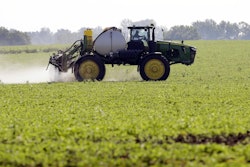EAGLE LAKE, Texas (AP) — Texas rice farmers probably won't get irrigation water to flood their fields for an unprecedented second consecutive year after officials overseeing major reservoirs in Central Texas voted Tuesday to cut off downstream allotments if there's no significant rain by March.
The Lower Colorado River Authority unanimously voted in Austin to withhold the water if the combined storage of Lakes Travis and Buchanan is less than 850,000 acre-feet on March 1. The lakes are currently at just more than 825,000 acre-feet, and it is unlikely there will be enough rain in the coming months to fill the reservoirs.
Texas is the fifth-largest rice producer in the United States, and the economies of three downstream counties are heavily reliant on the industry that contributes $1 billion annually to the state's economy.
Rice is typically grown in paddies, or flooded fields. The water helps rice grow in clay-like soil that is not good for most other crops and helps deter pests.
The state, though, has been dealing with a severe drought for several years, including a historic one-year spell through 2011 that was so hot and dry that many lakes and rivers still have not recovered. Those waterways feed the irrigation canals and streams upon which rice farmers rely.
While conditions aren't as bad as they once were, about 65 percent of the state remains in severe drought. The LCRA board voted in November to cut off water to rice farmers if the combined storage in the two lakes fell below 775,000 acre-feet on Jan. 1 or March 1. But the driest November and December since 1950 prompted the board to revisit that decision.
"We're in the middle of a drought that could end up being the worst in recorded history," LCRA General Manager Becky Motal said in a statement. "This drought has been painful for everyone, but LCRA is committed to protecting the water supply of the city of Austin and the other communities and major industries throughout the basin."
When the board decided to cut off water for the 2012 season, it was the first time in state history that rice farmers were denied irrigation waters from the lakes their forefathers lobbied to build in the 1940s.
Ronald Gertson, chairman of the Colorado Water Issues Committee, which represents downstream water interests, especially those of rice farmers, said he and other rice farmers are shouldering a disproportionate burden of the drought and called for LCRA to build downstream water storage facilities to ensure farmers have water.
"It is imperative that the burden of securing reliable water supplies be shared up and down the basin," he said in a statement.
Last year, crop insurance covered about half the farmers' losses, and many will likely get similar compensation this year, said Tom Kelley, a rice farmer and insurance broker in Eagle Lake. That money, though, is only available to farmers — not, for example, the marketers, diesel fuel sellers, storage facilities and others who support the industry, he said. And those that grow seed, a sizeable percentage of farmers in Colorado County, also are ineligible.
If water is cut off like last year, Kelley said he will be able to use groundwater to farm just over 100 acres of his 600-acre spread. His business partner, Bryan Wiese, didn't farm any of his 1,700 acres last year, and without water won't be able to this year either. To help deal with the loss, Kelley will cut his full-time worker down to part-time, and Wiese will lay off one of his two workers.
"You don't expect years like this," Wiese said. "You don't anticipate this to happen."
___
Associated Press writer Betsy Blaney contributed to this report from Lubbock, Texas.






















